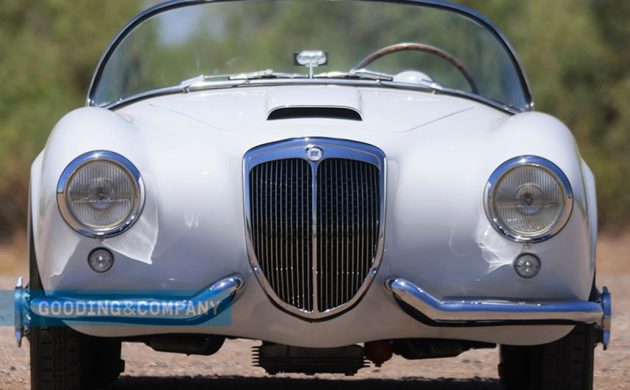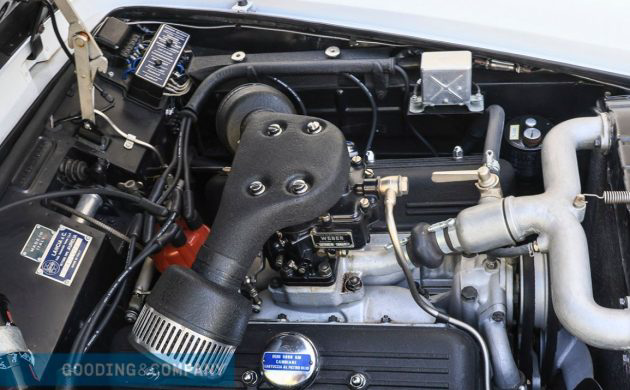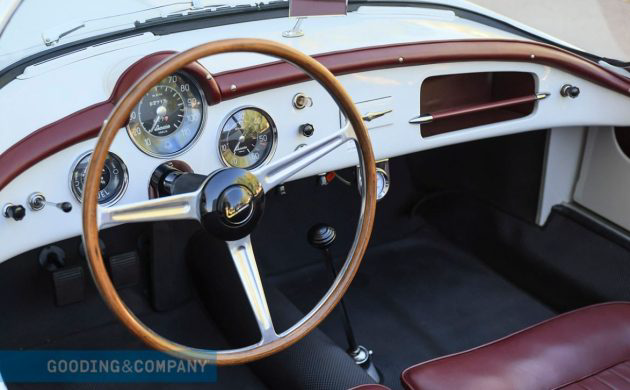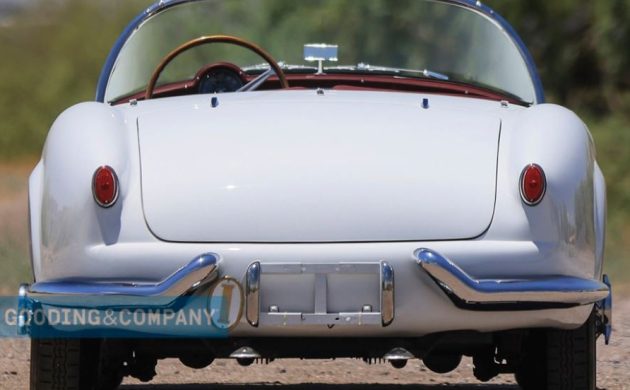Nearly every iteration of Lancia’s Aurelia model is desirable in its own way. But one stands above all others, and that is the B24 Spider America. This exquisite roadster is the quintessential Lancia, designed by Pinin Farina with its mechanical formula derived from the track-tested sedan. Only 240 examples were constructed from 1954 through 1955, and fewer survive today. Of these, 181 were in left-hand drive configuration (“S” for sinistra). The Spider America’s ancestor was a collaboration between Vittoria Jano – Chief Engineer at Lancia – and Francesco De Virgilio, who worked under Jano. De Virgilio was tasked with exploring V6 engine designs to find a way to rectify inherent vibration issues. In 1943, he arrived at a six-crankpin/four-journal solution in a 60-degree V, producing a smooth-running, compact motor. This engine sparked a revolution (ha ha) in V6 engine production – notable enough that Ferrari later hired Jano to help produce his Formula Two engine.
Initially, Lancia’s V6 was installed in the unassuming Aurelia B10 berlina. As the Aurelia evolved, displacement was gradually increased, eventually to 2451 cc’s. The new engine – equipped with a Weber twin-choke carburetor – produced 110 bhp (US delivery), propelling the Spider America to about 115 mph. Gearchanges are courtesy of a four-speed transaxle, rear-mounted for favorable weight distribution. The front suspension is a sliding pillar type; the rear suspension is a de Dion tube; and drum brakes are found all around, with the rears inboard. This heavily-historied example has a documented matching numbers engine, a restoration fresh as of 2012, and an accompanying class award at that year’s Pebble Beach Concours d’Elegance.
While the car’s exterior broadcasts a masculine tension – with its pronounced haunches, hood scoop, and bold grille – the interior is almost feminine. The slender-spoked steering wheel, delicate spear across the glove box, thin leather cockpit surround – these elements are a perfect backdrop for the three Veglia gauges. An aftermarket auxiliary gauge is fitted to the right of the gearshift. Speaking of which, early Lancias have long gearshift levers, though changes are positive. This car comes with a complete tool set, assembled during the restoration, several original documents, and the factory owner’s manual.
Several style details define the Spider America including its panorama windshield, “horned” bumpers, side curtains (it is a true roadster), and interior door pull. The later B24 convertible refined the drop-top Lancia with exterior door handles, a flatter windshield, and straight one-piece bumpers. It’s a less desirable car in the marketplace, though no one I know would turn one away. If you are reaching for the apex of Lancia production, see this 1955 Spider America for sale here at Gooding & Company’s Pebble Beach Auction, held on August 16 and 17. The estimate is $900k to $1 million. Though a stiff price, it’s correct in the current market – and off the 2015/16 highs when Spider Americas routinely exceeded $1 million at auction. Araknid78 submitted this tip for us – thanks!








You’ve done it again, Michelle! A terrific writeup of a car I’d love to own but never, ever could. Apparently never in (or near) a barn, but who cares?
These were amazing engineering masterpieces, and if any car deserves an unobtainium price tag, I’d say this is definitely one of them.
I’ve seen a couple, have actually sat in one, but never got to drive. I’m sure it’s a great experience. All those details, from the steering wheel to the instruments, to the finishes in the engine bay — the cars came from the factory looking nearly as nice — is positively jewel-like.
The Lancia, and cars like it, are the decorations on the Bran Finds cake!
Thanks so much, RayT! I love Lancias…. they’re so weird and wonderful.
This car actually was found in a barn in California in 1980, probably just a few miles from where it will be auctioned (Monterey peninsula). It sat around for decades after a start-and-stop restoration process, until roughly 2009.
If the 1953 Corvette had been designed in Italy, it might have looked like this. Simply gorgeous. The only thing missing is a young Sophia Loren to drive it.
Revolution, excellent!
I think these are the most beautiful cars of this era. There was a great one in the Bridget Bardot movie, And God Created Woman
Iconic car, but all that engineering doesn’t actually deliver much power. 110 bhp from 2.5 litres was not good even in period.
Car will sell well, but there are many cars I’d buy first for this kind of money. Alfa TZ1 for example!
To learn more about Lancia, De Virgilio, and their V4 and V6 engines, read my friend Geoff Goldberg’s book, “Lancia And De Virgilio, At The Center,” out of print but available used on Amazon.
Michelle, I to enjoy your writing style.
Love this car.
Thanks, Rick! Yes, it’s a gorgeous car, and the recommendation of the book on De Virgilio (from Frank above) is worthwhile. It’s intensely interesting how these characters intertwined, and how their passions generated ingenuity.
Not sure what Martin Horrocks means by power output not good in the day. In 1955, Chevrolet had two variations on the 235ci 6 cylinder and a 265 ci 8 cylinder. Power outputs were 32bhp /litre, 35bhp/litre and 37bhp/litre respectively . The 44 bhp/ litre of the Lancia looks very respectable for the day. All that technology and engineering was not wasted.
It’s hardly comparing like with like. Chevy is made in millions with conservative engineering designed to require minimal maintenance. Like no Lancia ever….
If a handbuilt European V6 designed to compete at the highest level of the GT game can only produce an extra 10-15% over a cooking engine, it’s not really justifying its complexity.
I understand Lancia is about other things, but power is fundamental and Lancias never score well in that respect. At the time, Alfa was getting a very usable 90 bhp from just 1300cc with its Veloce spec cars, for example.
unsold at Pebble Beach auction on 8/16-17 2024. Now Asking Price
$875,000